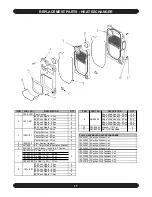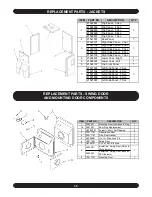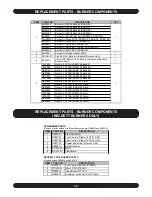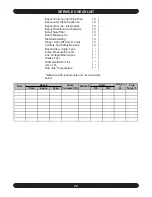
11
!
!
!
!
!
!
NORMAL SEQUENCE OF OPERATION
On a call for heat, the thermostat will actuate, com-
pleting the circuit to the boiler. In turn, the ignition
systems are activated and ignition will begin.
In the event of a low water condition, an automatic
low water cut-off device will interrupted power be-
tween the low water cut-off and the burner. The
burner will remain off until the low water condition is
corrected, (i.e., manually restore boiler water or
utilize a water feeder device which will automatically
restore water to its normal operating level).
IMPORTANT TO THE INSTALLER -
Before putting
the boiler in operation, test the mechanical low water
cut-off device for proper operation. While burner is
on, open the blow-off valve located in the lower
portion of the cut-off body. This will drain the water
quickly from the cut-off body and break the circuit to
the burner. If it does not, replace control.
WARNING
WATER WILL BE BOILING HOT.
OPERATING INSTRUCTIONS
The venting system should be inspected at the start
of each heating season. Check the vent pipe from
the boiler to the chimney for signs of deterioration by
rust or sagging joints. Repair if necessary.
Remove the vent pipe at the base of the chimney or
flue and, using a mirror, check for obstruction and
verify compliance to the latest revision of the NFPA
211.
The lever of the pressure relief valve
(Figure 12)
on
the boiler should be operated periodically to make
sure that it is functioning properly.
WARNING
Discharge will be boiling hot water and steam.
The pressure relief valve should open before the
steam pressure exceeds the 15 lb. reading on the
gauge. If this pressure is exceeded and the pressure
relief valve leaks steam when the boiler is operating
at normal pressures, it should be immediately
replaced. Corrosion can build up rapidly at the valve
seat and prevent its functioning as a safety device.
START-UP AND ADJUSTMENT
OF OIL BURNER
(See oil burner instructions for nozzle and electrode setting).
CAUTION
DO NOT SET FIRE VISUALLY.
Instruments are the only reliable method to
determine proper air adjustments. An
improperly adjusted burner causes soot and
high fuel bills because of incomplete
combustion of the fuel oil. This in turn may
require excessive boiler maintenance, service
costs, and in some instances, house cleaning
or redecorating. A competent service
mechanic should be consulted to make the
proper adjustments with a smoke tester, CO
2
indicator, and draft gauge. NOTE: Bacharach
or Dwyer test kits include these instruments.
A. Check oil burner nozzle to make certain it is tight
in adapter. Burner mounting bolts should be tight.
B. Check electrode setting, as they may have been
jarred out of position during transportation.
C. Lubricate burner motor if necessary.
FIGURE 12




















